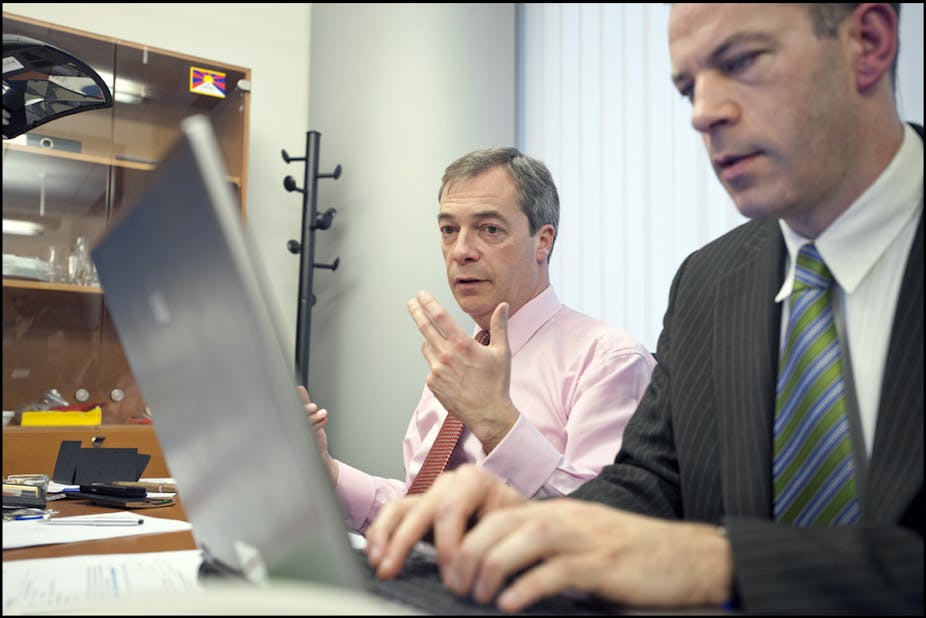Nigel Farage, leader of the UK Independence Party, appears to have stolen the show in the run up to the European elections. But while he has been pilloried in the papers, discussion about him on Twitter appears to have been somewhat more favourable.
Since campaigns for the European elections have been largely fronted by party leaders, we’ve investigated the level of mainstream media coverage given to David Cameron, Nick Clegg, Ed Miliband and Nigel Farage over the past six days. We’ve also looked at how much discussion has been going on about the leaders on Twitter over the same period.
We looked at all geo-tagged UK tweets and all national tabloid and broadsheet newspaper coverage of the Conservative, Lib Dem, Labour and UKIP leaders over the period. We analysed the amount of coverage and discussion each party leader received online and offline each day, and the proportion for each that was positive, negative or neutral.

While there has been plenty of mainstream newspaper coverage of major party leaders in the run-up to EU elections, particularly focusing on Farage, this has not been reflected in online discussions. For a start, political discussion only featured in about 2% of the almost 3m tweets we monitored.
Overall, both online and offline, Cameron and Farage have been the most prominent, trailed by Miliband and Clegg on both platforms.
But Farage in particular has been the subject of very different coverage in the online world and the more traditional press. While the UKIP leader’s media coverage spiked immediately following his now infamous LBC interview, his mentions on Twitter suggest that the online reaction was more of a slow burn, though the tone of the discussion did become slightly more negative. Perhaps the LBC episode failed to inflame passions online becuase it simply seemed to confirm what existing views of Farage – both for and against.

What’s more, the intensely negative coverage of Farage in the mainstream media has not been replicated online. If you only read the papers, you’d find that 31% of the comments made about Farage were negative, while between 20-21% of those made about Miliband, Clegg and Cameron could be classed as such.
But the proportion of tweets mentioning Farage that were negative was near identical to Miliband and Clegg at between 22% and 23%. Cameron got an easier ride with just 13% of tweets about him coding as negative.

No less than four simultaneous campaigns have been bubbling away in the UK as we carried out this analysis. While the European and local elections have fired the starting gun for the general election, the Scottish independence debate is also in full swing, not to mention the addition of a possible EU referendum.
This has meant that discussion and coverage this week has been fragmented. Miliband has spent the week laying out his policy for the general election amid claims that he’s been missing in action when it comes to European campaigning.
Cameron of course spent two days on a pro-union visit to Scotland, and much of rest of his exposure concentrated on the Chilcot Inquiry and coalition tensions. Clegg, meanwhile, has gained attention for all the wrong reasons: drunken cactus shame; losing his rag with Michael Gove and Andrew Marr; Commons whispers of a Lib Dem deposition and some polls suggesting the party may well fall behind the Greens in Europe.
In contrast, although reporting on Farage was dominated by the fallout from his LBC interview and questions about whether he is or isn’t a racist, it did stay focused on the strength of his party’s electoral prospects and his stance on immigration. What else is there to talk about?
Farage has become the focal point not just for the media, but for the major party leaders this week – that is, when they weren’t focusing on other elections. This short campaign has seen little coherent debate between parties and while their antics of course top the printed press agenda, our data suggests that they are not engaging debate among the wider public.
It also suggests that media lambasting of Farage doesn’t look set to change voters’ minds – at least not those on Twitter.

